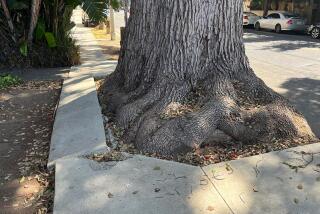L.A. Moves to Broaden Inspectors’ Jurisdictions : Government: Plan would give enforcement officers power to attack a wide range of code violations. Building and safety, street vendors would be affected.
That car parked on the neighbors’ lawn or that street vendor blocking the sidewalk has annoyed many an Angeleno.
But many find their frustration multiplied when they turn to their city government for help, only to have their complaints disappear in a welter of competing bureaucracies.
To untangle some of the mess, the Los Angeles City Council on Friday tentatively agreed to simplify the enforcement duties of the city’s army of inspectors, code enforcement officers and police.
*
Hundreds of enforcement specialists, previously restricted to narrowly defined and segregated tasks, would be empowered to attack a wide range of violations.
Traffic enforcement officers, now prohibited from working on private property, would be able to cite cars parked on front lawns. Building and safety inspectors, restricted to private property, would be able to ticket vendors illegally selling goods on a sidewalk. And Bureau of Sanitation inspectors could crack down on homeowners spraying pesticides, without waiting until the poison fouls a storm drain.
City Atty. James Hahn was instructed to draft revisions to the municipal code that would break down artificial barriers to efficient enforcement of the city’s laws. The City Council is expected to begin final consideration of the proposals in several weeks.
“This will simply cut the bureaucracy and let us enforce laws already on the books,” said City Councilman Richard Alarcon, who asked for the changes.
The enforcement problems came to light as the city tried to devise a strategy to crack down on illegal street vending. Council members learned that responsibility for the issue has been diffused among the Police Department, street use inspectors and building and safety inspectors.
*
Some savvy street vendors have taken advantage of the limited jurisdictions of the civilian inspectors. They step onto private property when they see street use inspectors coming--knowing they can only be cited by the inspectors on a public right of way.
Conversely, they can thwart building and safety inspectors, who only enforce codes on private property, by stepping onto the sidewalk.
By being given joint authority in enforcing the city’s myriad codes, enforcement officers will not be so easily tripped up by jurisdictions.
A parking enforcement officer from the Department of Transportation will be able to issue standard parking tickets and then shift gears to ticket cars parked on lawns or blocking driveways.
A street use inspector will be able to issue a citation to a construction crew that has blocked a crosswalk with lumber, and ticket the construction vehicles that are parked illegally.
And when citizens call to complain about illegally posted signs, building and safety and street use inspectors will be able to handle the problem, whether the signs hang on public or private property.
“We get calls on these things all the time and it really affects the ways communities look and function,” Alarcon said.
He said residents have been shocked and angered when they have been referred from one city department to another. Such runarounds will be reduced by the changes, said James Washington, the city’s chief street use inspector.
“To most people, they feel like they are just getting bounced from the Police Department to street use to building and safety,” Washington said. “They think it’s just a shell game. This will make it easier on us too.”
More to Read
Sign up for Essential California
The most important California stories and recommendations in your inbox every morning.
You may occasionally receive promotional content from the Los Angeles Times.










